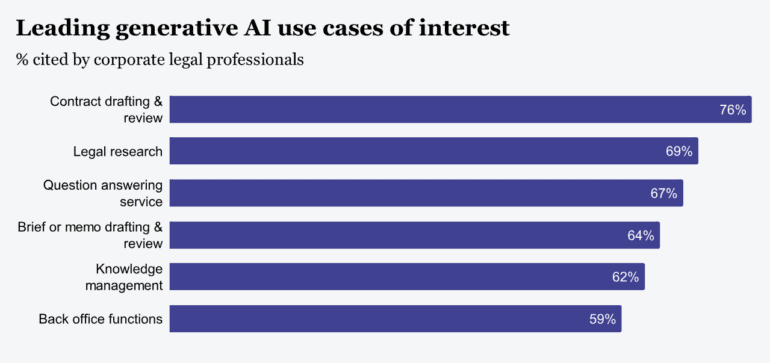TL;DR:
- 54% of in-house legal professionals support the use of generative AI.
- 82% of corporate legal professionals believe generative AI tools can be utilized for legal work.
- Areas of potential utility for generative AI in the legal industry include contract drafting and review (76%), legal research (69%), and question answering (67%).
- The use of generative AI is seen as transformative in improving efficiencies for legal and tax professionals.
- 65% of respondents believe generative AI should be used for non-legal or non-tax tasks, such as administrative duties and document generation.
- Risk concerns around privacy, confidentiality, data security, and accuracy impact the adoption of generative AI tools in the legal industry.
- Thomson Reuters predicts that as generative AI tools advance and handle customer data more judiciously, risk concerns will decrease over time.
- Companies are implementing policies and warnings regarding generative AI usage.
- Corporate legal and tax departments have limited knowledge about whether their outside law firms are using generative AI.
Main AI News:
54% of in-house legal professionals express support for the utilization of generative AI, according to recent survey data from the Thomson Reuters Institute. The findings reveal that these professionals are cautiously considering the potential benefits before fully embracing generative AI tools.
Interestingly, a significant majority of corporate legal professionals, accounting for 82% of respondents, acknowledge the suitability of generative AI tools like ChatGPT for legal work. Since the launch of ChatGPT last year, these generative AI tools have gained popularity due to their ability to swiftly generate a wide range of content.
In-house legal professionals identify several areas where they believe generative AI can be particularly useful. The foremost areas include contract drafting and review, which garnered support from 76% of respondents, followed by legal research at 69%, and serving as a question answering service at 67%.
The Thomson Reuters report elaborates on the sentiments of those who advocate for the application of generative AI in legal and tax work. They perceive its use cases not only as a seamless fit within the daily tasks performed by legal and accounting professionals but also as potentially transformative in their pursuit of greater efficiencies.
The report further reveals that 65% of all respondents believe generative AI should be utilized for non-legal or non-tax-specific tasks. This marks a notable 13 percentage point increase compared to those who endorse its usage for legal or tax-specific purposes. The non-legal or non-tax tasks cited encompass administrative duties, internal time and bookkeeping, as well as email and non-work document generation.
The survey report highlights that concerns regarding risk have significantly contributed to the cautious adoption of generative AI tools by legal and tax professionals to date. These professionals express apprehensions primarily in four key areas: privacy, confidentiality, data security, and accuracy.
Regarding privacy, respondents harbor specific concerns regarding public-facing tools like ChatGPT and the handling of data loaded into such tools. The Thomson Reuters report recognizes that as generative AI tools continue to evolve and demonstrate greater power and discretion in their handling of customer data, the associated risks are expected to diminish over time.
Steve Hasker, the president and CEO of Thomson Reuters, emphasized the potential revolution of professional work through generative AI. He urged the industry to collaborate in striking the right balance between the advantages of technology and any unintended consequences.
In the interim, certain companies have implemented policies governing the usage of generative AI, while others have cautioned employees against unauthorized use of such technology. For instance, approximately 24% of corporate legal departments have issued warnings regarding the use of ChatGPT or generative AI.
Moreover, the report highlights that corporate legal and tax departments are largely unaware of whether their external law firms are employing generative AI. The report reveals that 83% of corporate legal respondents stated their lack of knowledge regarding the usage of generative AI or ChatGPT by their outside law firms.
The online survey conducted by Thomson Reuters Institute targeted corporate legal professionals between April 11 and 25. The survey garnered responses from 587 relevant professionals in the United States, the United Kingdom, and Canada. The majority of respondents represented legal departments consisting of 50 employees or fewer.
Conclusion:
The survey results reveal a mixed landscape for the adoption of generative AI in the legal industry. While a significant percentage of in-house and corporate legal professionals support its use and recognize its potential in various legal tasks, concerns about risks related to privacy, data security, and accuracy are hindering widespread adoption. Nonetheless, as generative AI tools evolve and address these concerns, the market can expect to see increased integration and collaboration between professionals and AI technologies. The legal industry has the opportunity to leverage generative AI’s capabilities to improve efficiency and productivity in both legal and non-legal tasks, but striking the right balance between technological benefits and risk mitigation will be crucial for successful implementation.

